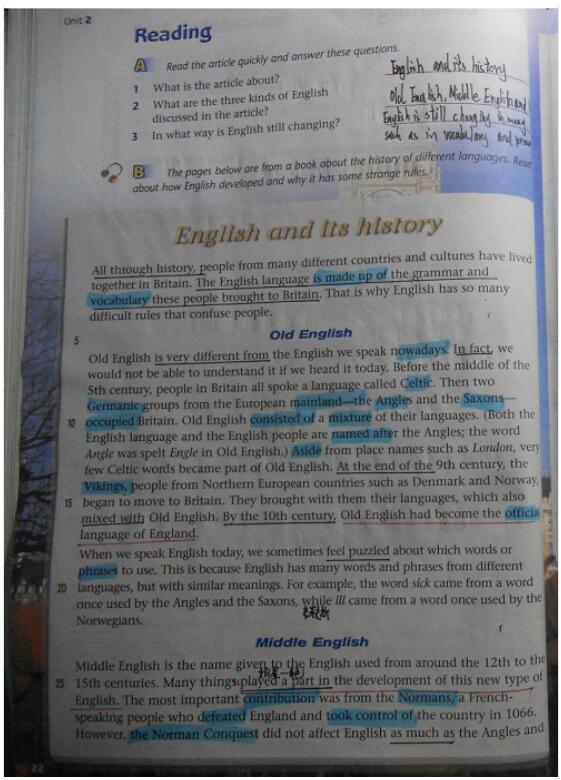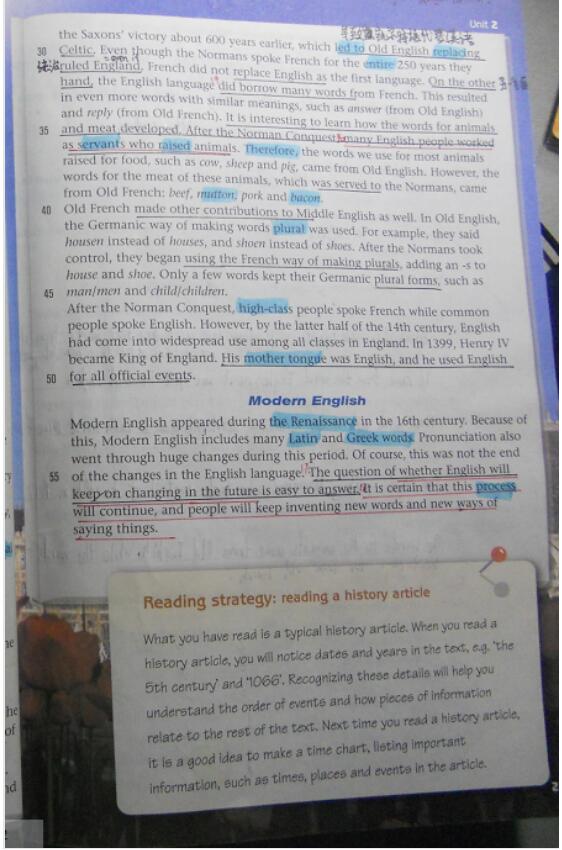| 第 1 页:模拟试题 |
| 第 2 页:参考答案 |
一、单项选择题(本大题共30小题,每小题2分,共60分)
1. Ten years ago the population of our village was _____ that of theirs.
A. as twice large as B. twice as large as
C. twice as much as D. as twice much as
2. In the cinema, there was an old man _____ beside me.
A. sat B. sit C. sitting D. to sit
3. The multinational corporation is making a take-over _____ for a property company.
A. application B. bid C. proposal D. suggestion
4. —I’m surprised to hear that Sue and Paul have _____.
—So am I. They seemed very happy together when I last saw them.
A. broken up B. finished up C. divided up D. closed up
5. — Do you think you could do without help?
— _____. This is not the first time for me.
A. Take care B. Hurry up C. Not exactly D. Don’t worry
6. The affix “-able” in the word “touchable” is a (n) _____.
A. derivational infix B. derivational suffix C. inflectional infix D. inflectional suffix
7. Concerning pidgin and creole, which of the following is NOT true?
A. A pidgin is not a native language of a particular region.
B. Pidgins are rule-governed, like any human language.
C. Creole is essentially pidgin.
D. Pidgins are created to serve a wide range of communicative purposes.
8. [p], [t], [k] are _____.
A. fricatives B. affricates C. glides D. stops
9. Which of the following sentences is a two-place predicate?
A. It is snowing. B. The baby is sleeping.
C. John gave Mary a book. D. Jack loves Mary.
10. The structural view limits knowing a language to knowing its structural rules and vocabulary. The communicative or notional-functional view adds the need to know how to _____ the rules and vocabulary to do whatever it is one wants to do.
A. use B. analyze C. learn D. remember
11. If a teacher asks “What does corrective feedback mean”, this type of question is called “_____”.
A. referential question B. tag question
C. rhetorical question D. display question
12. A variety of games, role-plays, situations, etc. are _____ communicative activities prepared to support the Communicative Language Teaching.
A. text-based B. task-based C. game-based D. situation-based
13. What is the purpose of using information gap activity?
A. To prepare students for oral presentation.
B. To provide students with an enjoyable activity based on effective communicative approaches.
C. To ask students to listen and write.
D. To make enough input.
14. In _____, substitutional and transformational drills are frequently used and aimed at form accuracy.
A. cognitive processing B. communicative practice
C. meaning practice D. mechanical practice
15. In a conversation about how to spend a holiday, a student says, “I have plan to go traveling with my family.” Which of the teacher’s feedback will keep up communication as well as help the student correct his syntax error?
A. You should say you have planed to go traveling with your family.
B. Why not say you planned to go traveling with your family?
C. You say you haveplan to go traveling?
D. You should pay attention to the tense of the sentence.
16. Which of the following does a teacher want his / her students to develop if he / she guides them to take notes key words, abbreviations and symbols?
A. Cultural awareness. B. Language awareness.
C. Learning strategies. D. Language knowledge.
17. According to The National English Curriculum Standards, the language knowledge students are required to learn consists of phonetics, vocabulary, grammar, _____.
A. function and theme B. culture and society
C. literature and linguistics D. discourse and genre
18. Which of the following should a teacher avoid when using an ELT course book?
A. Selecting appropriate supporting materials and resources.
B. Interpreting curriculum goals and its expectations for the course.
C. Planning lessons in relation to specific goals, topics, texts, and tasks.
D. Implementing everything in the book without considering students’ needs and levels.
19. Total Physical Response as a TEFL method is more often used for teaching ____.
A. children B. adults C. ESP course D. GE course
20.Which of the following is an example of teachers’ indirect corrective feedback?
A. say “went” instead of “go”
B. we never use “at” that way
C. choice A is not the right answer
D. who can help him with this sentence?
请阅读Passage 1,完成21~25小题。
An electric signal can trick a monkey’s brain into believing the animal’s finger has been touched.
Touch something, and your brain knows. The hand sends signals to the brain to announce contact was made. But that feeling of touch may not require making actual contact, tests on monkeys now show. Zapping brain cells can fool the animal into thinking its finger has touched something.
A person who has lost a limb or become paralyzed may need an artificial limb to complete everyday tasks. But such patients may not truly feel any objects they hold. The new findings point toward one day creating a sense of touch in those who use such artificial limbs. Psychologist Sliman Bensmaia of University of Chicago worked on the new tests. His team’s findings appeared on October 14 in the Proceedings of the National Academy of Sciences of the United States of America.
The sense of touch is crucial to everyday tasks: People without it may have difficulty cracking an egg, lifting a cup or even turning a doorknob. That’s why restoring it is a major goal for designers of artificial limbs.
In their new study, Bensmaia and his co-workers worked with rhesus monkeys (恒河猴). The scientists implanted electrodes (电极)--- small devices that can detect and relay an electrical signal—into the animals’ brains. The scientists used the electrode data to identify which neurons had become active. Then the scientists used the implanted electrodes to zap those same neurons. And the monkeys reacted as though their fingers had been touched. In fact, they hadn’t.
The monkeys couldn’t use words to tell the scientists what they had felt. Instead, they communicated by looking in a particular direction—just as when they had really been touched.
The new findings show how touch-sensitive devices could be built. The new study also offers “a nice clear pathway” for figuring out how to restore a sense of touch to an amputee(被截肢者) or someone with a injury of spinal cord.
The study shows how artificial limbs might be connected to the brain so that a person can “feel” with such a prosthesis (假肢). But such a supersensory device doesn’t exist yet and scientists have a lot of work to do before people will benefit from it. Researchers must first figure out whether the electrodes would work in people in the same way they do in monkeys.
“I think the foundation is laid for human trials,” Bensmaia said.
21.What does the underlined word “it” refer to?
A. The sense of touch B. An artificial limb
C. The turning of a doorknob D. The lifting of a cup
22.Bensmania tested monkeys to prove that the feeling of touch _____.
A. is important to everyday tasks
B. may not require making actual contact
C. is a problem of life and death
D. may be a challenge for designers of artificial limbs.
23.Monkeys tell researchers their sense of touch by _____.
A. putting up one of their fingers B. making their brain cells active
C. looking in a particular direction D. mimicking natural signals in the brain
24.The last sentence of the text suggests humans _____.
A. will use touch-sensitive devices B. will test monkeys soon
C. lay foundations for monkey trials D. will be tested on the electrodes
25.The passage is mainly about _____.
A. restoring a sense of touch B. fooling a clever monkey
C. making new artificial limbs D. sending a signal with a touch
请阅读Passage 2,完成26~30小题。
Passage 2
On a five to three vote, the Supreme Court knocked out much of Arizona’s immigration law Monday-a modest policy victory for the Obama Administration. But on the more important matter of the Constitution, the decision was an 8-0 defeat for the Administration’s effort to upset the balance of power between the federal government and the states.
In Arizona v. United States, the majority overturned three of the four contested provisions of Arizona’s controversial plan to have state and local police enforce federal immigration law. The Constitutional principles that Washington alone has the power to “establish a uniform Rule of “Naturalization” and that federal laws precede state laws are noncontroversial. Arizona had attempted to fashion state policies that ran parallel to the existing federal ones.
Justice Anthony Kennedy, joined by Chief Justice John Roberts and the Court’s liberals, ruled that the state flew too close to the federal sun. On the overturned provisions the majority held the congress had deliberately “occupied the field” and Arizona had thus intruded on the federal’s privileged powers.
However, the Justices said that Arizona police would be allowed to verify the legal status of people who come in contact with law enforcement. That’s because Congress has always envisioned joint federal-state immigration enforcement and explicitly encourages state officers to share information and cooperate with federal colleagues.
Two of the three objecting Justice-Samuel Alito and Clarence Thomas-agreed with this Constitutional logic but disagree about which Arizona rules conflicted with the federal statute. The only major objection came from Justice Antonin Scalia, who offered an even more robust defense of state privileges going back to the alien and Sedition Acts.
The 8-0 objection to President Obama turns on what Justice Samuel Alito describes in his objection as “a shocking assertion of federal executive power”. The White House argued that Arizona’s laws conflicted with its enforcement priorities, even if state laws complied with federal statutes to the letter. In effect, the White House claimed that it could invalidate any otherwise legitimate state law that it disagrees with.
Some powers do belong exclusively to the federal government, and control of citizenship and the borders is among them. But if Congress wanted to prevent states from using their own resources to check immigration status, it could. It never did so. The administration was in essence asserting that because it didn’t want to carry out Congress’s immigration wishes, no state should be allowed to do so either. Every Justice rightly rejected this remarkable claim.
The Supremacy Clause of the United States Constitution declares that federal laws are the “supreme Law of the Land.” Hence, state court laws are inferior so long as the federal law is valid . Given the split jurisdiction between federal and state sovereignty set up by the Constitution, one major point of contention is the ‘in pursuance thereof’ phrase in the Supremacy Clause. This means that it is not always possible to make a federal law in certain areas - that is, certain areas of law are reserved solely for the states to regulate, and any federal law in that area is unconstitutional. Defining this split of exclusive jurisdiction is the job of the Judicial Branch via interpretation of the Constitution, and has changed over time. In any case, the Constitution itself retains supremacy, so even if federal law is forbidden in certain areas, the Constitution itself always is supreme over any state law.
The standards for resolving putative conflicts between federal laws are not always clear, and neither for that matter is the standard for determining what constitutes a federal law capable of superseding effect. The technique of setting federal norms of professional conduct on a decentralized basis by borrowing or incorporating state norms is increasingly trouble- some to the extent that the borrowed state norms are disuniform and that they are being put to multiple remedial purposes. Federal legislation preempting state law of professional conduct is conceivable but hardly likely, particularly as the norms are pressed into duty for purposes other than professional discipline. Pending other steps that might lead to national uniformity, the answer for the federal courts may be a uniform set of norms directly regulating litigation conduct in all federal courts.
26. Three provisions of Arizona’s plan were overturned because they _____.
A. deprived the federal police of Constitutional powers.
B. disturbed the power balance between different states.
C. overstepped the authority of federal immigration law.
D. contradicted both the federal and state policies.
27. On which of the following did the Justices agree, according to Paragraph 4?
A. Federal officers’ duty to withhold immigrants’ information.
B. States’ independence from federal immigration law.
C. States’ legitimate role in immigration enforcement.
D. Congress’s intervention in immigration enforcement.
28. It can be inferred from Paragraph 5 that the Alien and Sedition Acts _____.
A. violated the Constitution B. undermined the states’ interests
C. supported the federal statute D. stood in favor of the states
29. The White House claims that its power of enforcement _____.
A. outweighs that held by the states B. is dependent on the states’ support
C. is established by federal statutes D. rarely goes against state laws
30. What can be learned from paragraph 7?
A. Immigration issues are usually decided by Congress
B. Justices intended to check the power of the Administration
C. Justices wanted to strengthen its coordination with Congress
D. The Administration is dominant over immigration issues
二、简答题(本题共1小题,20分)
根据题目要求完成下列任务,用中文作答。
如何理解英语学习中的探究活动的意义和价值?(8分)怎样设计探究性的学习活动?(12分)
三、教学情境分析题(本大题1小题,30分)
根据题目要求,完成下列任务,用中文作答。
以下是某高中英语教师教授短文的教学片段:

根据所给材料回答下列三个问题:
(1)该教师采用了什么教学方法?用这种方法进行词汇教学有何缺点?(10分)
(2)针对该教学方法的缺点,对该教师的词汇教学提出建议。(12分)
(3)列举两种常见的词汇教学模式,并简要说明。(8分)
四、教学设计题(本大题1小题,40分)
根据提供的信息和语言素材设计教学方案,用英文作答。
设计任务:请阅读下面学生信息和语言素材,设计一节20分钟的英语阅读课的教案。教案没有固定格式,但须包含下列要点:
● Teaching objectives
● Key and difficult points
● Major steps and time allocation
● Activities and justifications
教学时间:20分钟
语言素材:


相关推荐:
2020上半年教师资格《幼儿综合素质》模拟题汇总※ 报名公告汇总
2020教师资格准考证打印时间及入口 ※ 教师资格考试时间 ※ 考试科目
2020年教师资格证考试大纲 ※ 教师资格复习指导※教师资格考试教材
·2020教师资格证考试小学教育知识考点习题(21) (2020-7-1 9:57:11)
·2020教师资格证考试小学教育知识考点习题(20) (2020-7-1 9:56:11)
·2020教师资格证考试小学教育知识考点习题(19) (2020-7-1 9:55:11)
·2020教师资格证考试小学教育知识考点习题(18) (2020-7-1 9:54:11)
·2020教师资格证考试小学教育知识考点习题(17) (2020-7-1 9:52:11)
·免费真题 ·模考试题


实用文档 | 入党资料 | 入党申请书 | 入党志愿书 | 个人自传 | 转正申请书 | 思想汇报 | 个人简历 | 简历模板 | 简历封面 | 工作计划 | 工作总结 | 自我评测
个性评测 | 社交评测 | 事业评测 | 运势评测 | 报告 | 实习报告 | 工作总结 | 社会实践 | 心得体会 | 述职报告 | 调查报告 | 辞职报告
法律文书 | 合同范本 | 演讲范文 | 更多>>
英语学习 | 听力口语 | 阅读写作 | 翻译文化 | 趣味英语 | 学习方法 | 英文经典歌曲 | 每日课堂 | 空中英语 | 少儿英语 | 影视英语 | 英文歌曲 | 更多>>
作文大全 | 作文 | 小学 | 初中 | 高中 | 话题作文 | 考研 | 四六级 趣味作文 | 体裁作文 | 记叙文 | 议论文 说明文 | 应用文 | 读后感 | 作文素材 | 名言警句
优美段落 | 哲理故事 | 诗词赏析 | 成语知识 | 技巧 | 写作指导 | 作文点评 | 佳文赏析 | 写作基础 | 话题演练 | 作文教学 | 更多>>



